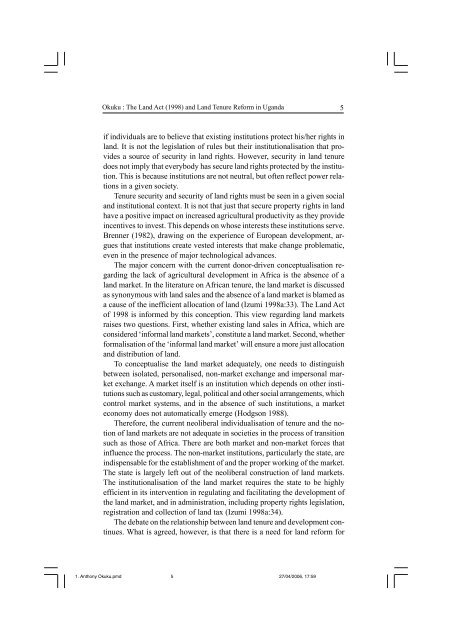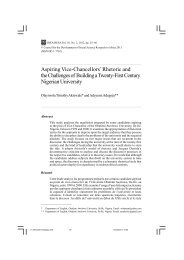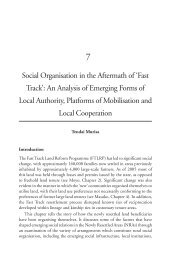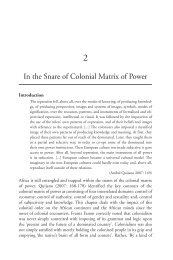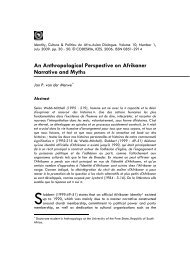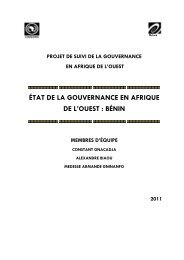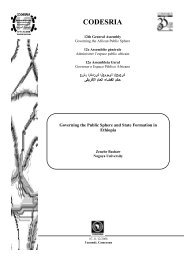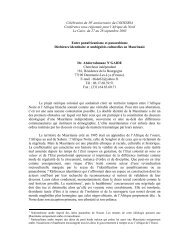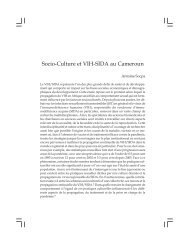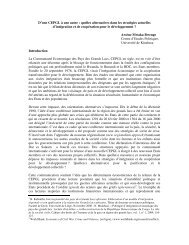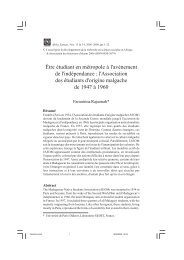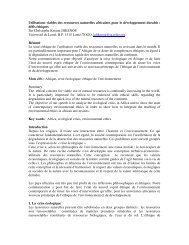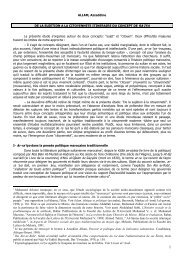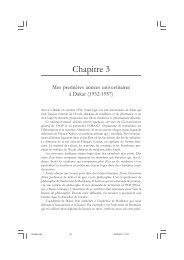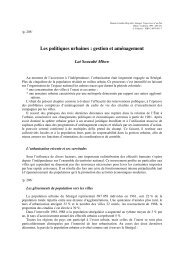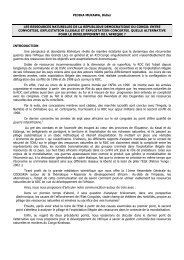and Land Tenure Reform in Uganda - codesria
and Land Tenure Reform in Uganda - codesria
and Land Tenure Reform in Uganda - codesria
You also want an ePaper? Increase the reach of your titles
YUMPU automatically turns print PDFs into web optimized ePapers that Google loves.
Okuku : The L<strong>and</strong> Act (1998) <strong>and</strong> L<strong>and</strong> <strong>Tenure</strong> <strong>Reform</strong> <strong>in</strong> Ug<strong>and</strong>a<br />
if <strong>in</strong>dividuals are to believe that exist<strong>in</strong>g <strong>in</strong>stitutions protect his/her rights <strong>in</strong><br />
l<strong>and</strong>. It is not the legislation of rules but their <strong>in</strong>stitutionalisation that provides<br />
a source of security <strong>in</strong> l<strong>and</strong> rights. However, security <strong>in</strong> l<strong>and</strong> tenure<br />
does not imply that everybody has secure l<strong>and</strong> rights protected by the <strong>in</strong>stitution.<br />
This is because <strong>in</strong>stitutions are not neutral, but often reflect power relations<br />
<strong>in</strong> a given society.<br />
<strong>Tenure</strong> security <strong>and</strong> security of l<strong>and</strong> rights must be seen <strong>in</strong> a given social<br />
<strong>and</strong> <strong>in</strong>stitutional context. It is not that just that secure property rights <strong>in</strong> l<strong>and</strong><br />
have a positive impact on <strong>in</strong>creased agricultural productivity as they provide<br />
<strong>in</strong>centives to <strong>in</strong>vest. This depends on whose <strong>in</strong>terests these <strong>in</strong>stitutions serve.<br />
Brenner (1982), draw<strong>in</strong>g on the experience of European development, argues<br />
that <strong>in</strong>stitutions create vested <strong>in</strong>terests that make change problematic,<br />
even <strong>in</strong> the presence of major technological advances.<br />
The major concern with the current donor-driven conceptualisation regard<strong>in</strong>g<br />
the lack of agricultural development <strong>in</strong> Africa is the absence of a<br />
l<strong>and</strong> market. In the literature on African tenure, the l<strong>and</strong> market is discussed<br />
as synonymous with l<strong>and</strong> sales <strong>and</strong> the absence of a l<strong>and</strong> market is blamed as<br />
a cause of the <strong>in</strong>efficient allocation of l<strong>and</strong> (Izumi 1998a:33). The L<strong>and</strong> Act<br />
of 1998 is <strong>in</strong>formed by this conception. This view regard<strong>in</strong>g l<strong>and</strong> markets<br />
raises two questions. First, whether exist<strong>in</strong>g l<strong>and</strong> sales <strong>in</strong> Africa, which are<br />
considered ‘<strong>in</strong>formal l<strong>and</strong> markets’, constitute a l<strong>and</strong> market. Second, whether<br />
formalisation of the ‘<strong>in</strong>formal l<strong>and</strong> market’ will ensure a more just allocation<br />
<strong>and</strong> distribution of l<strong>and</strong>.<br />
To conceptualise the l<strong>and</strong> market adequately, one needs to dist<strong>in</strong>guish<br />
between isolated, personalised, non-market exchange <strong>and</strong> impersonal market<br />
exchange. A market itself is an <strong>in</strong>stitution which depends on other <strong>in</strong>stitutions<br />
such as customary, legal, political <strong>and</strong> other social arrangements, which<br />
control market systems, <strong>and</strong> <strong>in</strong> the absence of such <strong>in</strong>stitutions, a market<br />
economy does not automatically emerge (Hodgson 1988).<br />
Therefore, the current neoliberal <strong>in</strong>dividualisation of tenure <strong>and</strong> the notion<br />
of l<strong>and</strong> markets are not adequate <strong>in</strong> societies <strong>in</strong> the process of transition<br />
such as those of Africa. There are both market <strong>and</strong> non-market forces that<br />
<strong>in</strong>fluence the process. The non-market <strong>in</strong>stitutions, particularly the state, are<br />
<strong>in</strong>dispensable for the establishment of <strong>and</strong> the proper work<strong>in</strong>g of the market.<br />
The state is largely left out of the neoliberal construction of l<strong>and</strong> markets.<br />
The <strong>in</strong>stitutionalisation of the l<strong>and</strong> market requires the state to be highly<br />
efficient <strong>in</strong> its <strong>in</strong>tervention <strong>in</strong> regulat<strong>in</strong>g <strong>and</strong> facilitat<strong>in</strong>g the development of<br />
the l<strong>and</strong> market, <strong>and</strong> <strong>in</strong> adm<strong>in</strong>istration, <strong>in</strong>clud<strong>in</strong>g property rights legislation,<br />
registration <strong>and</strong> collection of l<strong>and</strong> tax (Izumi 1998a:34).<br />
The debate on the relationship between l<strong>and</strong> tenure <strong>and</strong> development cont<strong>in</strong>ues.<br />
What is agreed, however, is that there is a need for l<strong>and</strong> reform for<br />
1. Anthony Okuku.pmd 5<br />
27/04/2006, 17:59<br />
5


